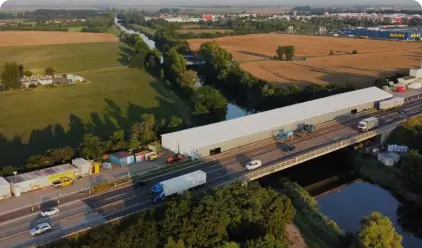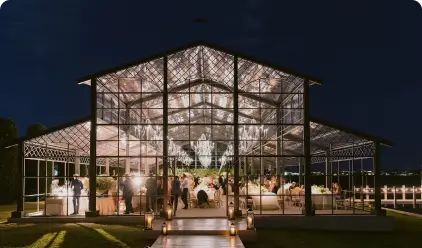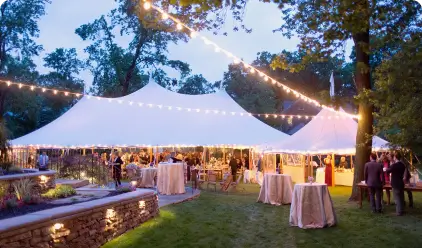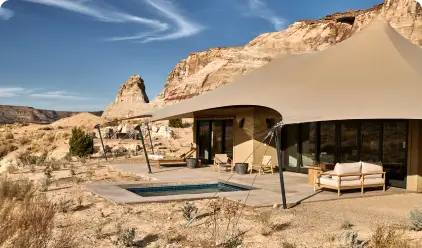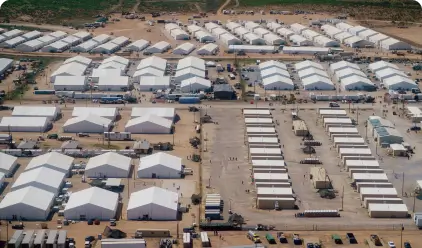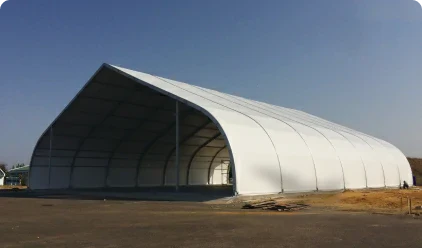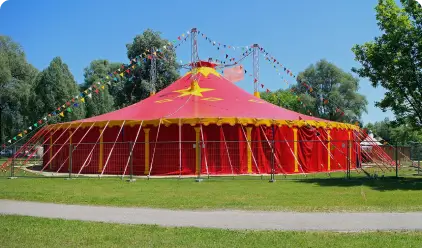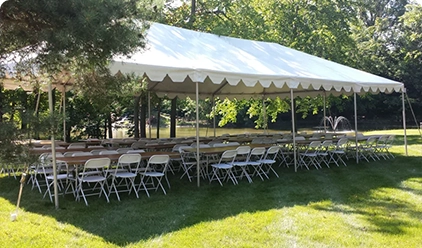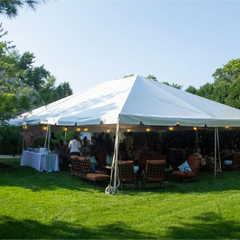How Much Does a 40x60 Tent Rental Cost?
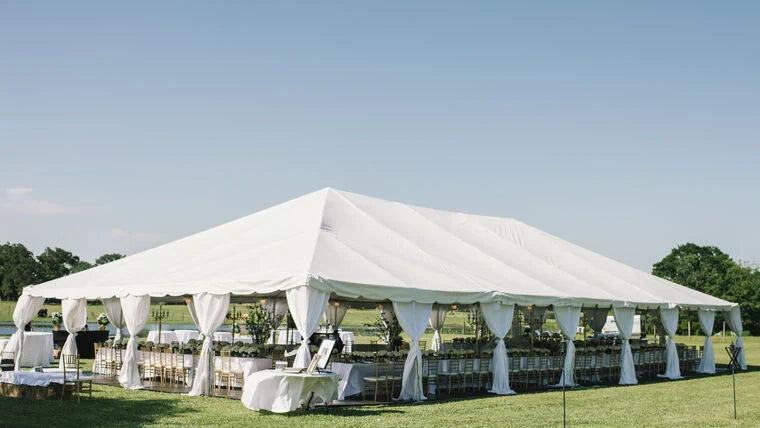
Preparing for an outdoor wedding, party, or large-scale event always requires careful consideration of the tent size and layout. And renting a 40x60 tent has become the first choice of many people because of its spaciousness and flexible applicability.
However, in the face of a variety of rental offers on the market, are you also torn: “What is the 40x60 tent rental cost?”
In fact, 40x60 tents cost roughly between $800 and $3000 to rent. However, the actual cost may fluctuate due to the following factors:
- Tent type and design
- Materials and durability
- Additional accessories
- Site conditions
- Season and slot
- Rental Duration
Next, we'll explore how each of these factors affects price.
🎈You May Also Like:
How Much Does a Tent Rental Cost | Final Verdict
16 Party Rental Ideas: Fun Things to Rent for Party
Factors Influencing 40x60 Tent Rental Cost for Weddings and Parties
Why is it that some people can get the same 40x60 tent for as little as $1,000 while others pay nearly $4,000? It's because there are 7 key variables hiding behind the base price of a large tent rental.
Tent Types & Design
The style and design of the tent can significantly affect the rental price. There is often a 30%-50% price difference between a simple, functional tent and a more decorative, beautiful style, mainly due to the differences in structural complexity, visual effect, and additional accessories.
Two common types of 40x60 tents from Sheltent are as follows:

The frame tent is designed without central poles, so it can be freely arranged when setting up the event, such as the stage, dining table, and dance floor. And it is easy to build, the ground requirements are not high (such as grass, asphalt or concrete pavement can be built), which saves time and labor.
Not only that, it has a simple and atmospheric appearance that makes it perfect for party tents and other venues that are used for their events.

The pole tent is the most traditional style of tent, with a central support pole design. It may be slightly limited in terms of space layout, but you can add extra touches (e.g. hanging fabric, lights) to cover the poles to enhance the aesthetics. You can dress it up any way you like. And if you just want to host a short-term event like a party, it's usually more affordable to rent.
Tent Material
Differences in tent materials offered by rental providers can cause prices to fluctuate. Obviously, higher-quality materials will be more expensive. However, we still recommend choosing tents whose tarps are made of high-density PVC-coated polyester fiber.
This is because this type of material has the triple properties of being waterproof, flame retardant, and UV resistant, which is kind of a guarantee to make your event go smoothly and improve the comfort of your guests.
Moreover, the frame part of this type is basically made of aluminum alloy. It is not easy to deform during frequent dismantling of the rental, and the renter does not need to bear the risk of postponing the event.
Additional Accessories
Basic tents provide only the frame structure, and additional accessories such as heating or cooling equipment, floor coverings, wall enclosures, decorative elements and lighting systems can add to how much to rent a tent.
Air-conditioning systems typically cost 3-5 times more to rent than fans and require supporting electrical circuits; solid wood flooring or non-slip carpeting costs about twice as much to lay as regular plastic flooring, but can elevate the event.

Among the wall types, transparent glass walls or soundproof fabrics cost more than ordinary tarpaulin walls, and decorative curtains or floral hangings require additional material and design fees. For lighting, basic lighting can be calculated at US$5-10 per square meter, while customized light strips, crystal chandeliers or dynamic light shows may cost more than the rental of the tent itself.
These accessories not only involve the cost of equipment purchase and maintenance, but also need to consider the cost of transportation, installation and labor commissioning. Therefore, the renter needs to make reasonable selections according to the needs of the event to avoid wasting the budget due to over-configuration.
Surface Preparation
Ground conditions also correlate with technical difficulty and additional cost of tent installation. This is because complex terrain can make installation more difficult and time-consuming. Basic installation services are usually included in the rental fee, but if the site presents special challenges (e.g., slopes, rocky ground, loose sandy soil, or dense tree roots), the renter will need to invest more labor and time in ground preparation.
So if the ground preparation requirements are high, customers often have to pay extra.
Seasonal Price
Tent rental prices are significantly affected by seasonal fluctuations. During the wedding season (e.g., May-September in summer) and holidays (e.g., Christmas and Spring Festival), the rental demand centrally explodes and the price generally increases.
At this point, rental companies will prioritize serving long-term contract customers, and temporary orders may face price increases or full slots.
Discounts may be available for off-season or non-holiday rentals, with some merchants offering a 20% discount or a free 1-day extension on weekdays. Rental costs will also increase during seasons of extreme weather (e.g. typhoon season, snowstorm season) due to the need for additional security measures.
It is recommended to plan 3-6 months in advance, avoid popular dates or choose weekdays for events to effectively reduce rental expenses.
Event Location
In popular cities or commercial centers where rental demand is higher, tent companies usually have more resources and service guarantees, so prices may be relatively higher. Overall, however, the overall rental cost is relatively more reasonable as transportation costs are usually lower due to shorter distances.
Conversely, if the event location is farther away and less accessible, the cost of transportation for the renter is higher, and then your rental price is also raised. Therefore, when renting a tent, you also need to evaluate the geographic location of the event ahead of time so that you can reasonably budget for the possible increase in transportation costs.
Tent Rental Duration
Typically, a single day rental is the most expensive, and as the number of days increases, the average daily rental will gradually decrease, but the cumulative cost may still rise significantly.
For example, the average daily cost for a 3-day rental may be 30% higher than a 7-day rental, but if the event requires long-term use of the tent for more than 30 days, some rental companies will adjust their cost structure to a monthly rental model. At this point, the total cost may approach or even exceed the value of the tent itself.
For high-frequency use (e.g., more than five events per year), the cumulative cost of long-term rentals may prompt customers to re-evaluate the economics of purchasing a tent, especially if storage and maintenance costs are manageable. For less frequent use or for occasional demand (e.g., a large celebration once every three years), renting can still maintain a cost advantage.
This frequency-of-use-based cost threshold is analyzed next.
How Much to Rent a 40x60 Tent? To Rent or Buy?
Based on the previous analysis, the total cost of leasing is affected by multiple factors, and the following table summarizes the major cost ranges:
| Influencing Factors | Estimated Cost Range |
|---|---|
| Tent types & materials | $20–$70 per square foot |
| Additional accessories | $150–$125,000 and even more (air-conditioning/flooring/finishing, etc.) |
| Ground handling | $0–$750 (depending on terrain complexity) |
| Transportation & installation | $150–$1200 (by distance and difficulty) |
| Season & location | High season/city prices 30%–50% higher |
| Lease duration | Long-term leases have lower average daily rents but higher cumulative costs |
In addition to the rental cost of the tent itself, the actual event often requires other supplies such as tables, chairs, tableware, lighting equipment, sound systems, etc., and most tent rental companies offer these packages as well.
However, the contents of the quotation provided by each supplier are different, some may be billed by packages, while others list the items separately. Therefore, before formally confirming the price, it is recommended to communicate clearly with the rental company about what exactly is included in the offer and whether transportation, set-up and take-down services are included to avoid unnecessary costs.
If certain accessories are not essential, they can be appropriately eliminated to help control the budget.
Is It Better to Rent or Buy a 40x60 Wedding Party Tent?
The decision to rent or buy a 40x60 wedding tent requires consideration of factors such as the frequency of use, storage conditions, and long-term needs. The following is a specific analysis:
• Duration of Rental: more economical to rent for short-term events (e.g., single weddings), and more cost-effective to purchase for long-term events.
• Frequency of Use: If the average annual use is more than 5 times, the cost of purchasing a tent may be less than the cumulative wedding tent rental prices.
• Storage Space: Long-term storage of tents may incur additional costs if there is no permanent storage, which can be avoided by renting.
• Maintenance Costs: Purchasing may incur cleaning and repair costs, while renting usually includes maintenance services.
| Tent Type | Single Rental Price Reference | Purchase Price Reference |
|---|---|---|
| 40x60 Frame Tent | $2,200.00 | $12,198.94 |
| 40x60 Pole Tent | $1,800.00 | $8,380.99 |
| 40x60 Clear Top Tent | $2,800.00 | $12,981.69 |
The above prices are for general reference. The specific wedding tent cost will fluctuate according to the choice of accessories and the quality of the tent material.
What To Ask When Getting a 40x60 Tent Rental Price Quoting

When consulting the 40x60 tent rental offer, it is recommended to communicate in depth with the service provider around the core needs and clarify the following key issues:
• Tent Condition and Appearance: Ask about the tent's frequency of use, maintenance records and degree of cleanliness, and you can ask to see the in-kind photos or videos, to avoid receiving aging and broken equipment.
• Cost Coverage: Check whether the quotation includes transportation, installation, dismantling and tax, some merchants may bill accessories (such as ground pegs, tie-down ropes) or basic lighting separately.
• Rental Duration Rules: Understand the minimum number of rental days (e.g., some merchants require a 3-day rental), whether long-term rental discounts are offered, and the charges for overtime returns.
• Accessories and Value-Added Services: Verify whether tables, chairs, flooring, air conditioning, etc. are included in the package, and if additional rental is required, ask whether there are combination discounts or package reductions.
• Liability and Insurance Terms: Clarify the details of compensation for damage and loss of equipment, as well as whether the trip can be canceled due to sudden changes in the weather (e.g., heavy rain, strong winds) for a refund or rescheduling.
• Building Requirements and Restrictions: Ask about the requirements for ground level and space height of the venue to avoid additional costs due to environmental incompatibility (if additional reinforcement or foundation treatment is required).
By refining the above questions, hidden consumption due to vague information can be avoided.
Conclusion
Before the actual large tent wedding and party rental, understanding the price components and rental rules is an important step to protect the budget and ensure the smooth running of the event. Through the previous analysis, we can see that the price of tent rental is determined by a variety of factors, such as style, accessories, venue, time and geography.
When choosing a tent, if you want to find a reliable quality, professional service and customized supplier, welcome to contact Sheltent, we provide a variety of specifications and styles of tent products and ancillary services, suitable for all kinds of weddings, festivals and commercial activities, to help you efficiently complete the event venue setup.
FAQs About 40x60 Tent Rental Cost
How Many People Can Fit Under a 40x60 Tent?
The 40x60 tent measures 2400 square feet (about 223 m²). By type of event:
- Standing event: approx. 200-300 people (1-1.5 m² per person).
- Banquet/Conference: Approx. 150-250 people (tables, chairs and aisle space must be reserved).
Similar tents are commonly used to accommodate 200-300 people, depending on the layout and type of event.
Table and Chair Rental Suggestions
- Round Table Configuration: 10 people per table with 10 chairs, reserved aisle space is recommended.
- Rental Ratio: 1 table + 10 chairs required for every 10 people, it is recommended to reserve redundancy according to the estimated number of people x 1.1 times.
Comprehensive proposal
- 200 people event: rent 20 tables + 200 chairs, reserve 20% redundancy.
- Event for 300 people: Rent 30 tables + 300 chairs, need to confirm whether the width of the tent aisle is sufficient.
- Consult the rental company: provide the tent size and event type, and get a professional layout plan.
Verdict: A 40x60 tent is suitable for 200-300 people. Tables and chairs need to be rationed according to 1:10. It is recommended to confirm the details with the rental company according to the specific type of activity.
What's the Average Price of a Tent Rental?
Tent rentals range from $0.75 to $1.50 per square foot. For a 40x60 foot (2400 sq. ft.) tent, the rental cost can be calculated as follows:
- Minimum Price: 2400 sq. ft. × $0.75/sq. ft. = $1800
- Maximum Price: 2400 sq. ft. × $1.50/sq. ft. = $3,600
Therefore, the rental price range for a 40x60 tent is approximately $1,800 to 3600 USD. Prices may vary depending on a variety of factors, so we recommend contacting multiple rental companies for detailed quotes.




























